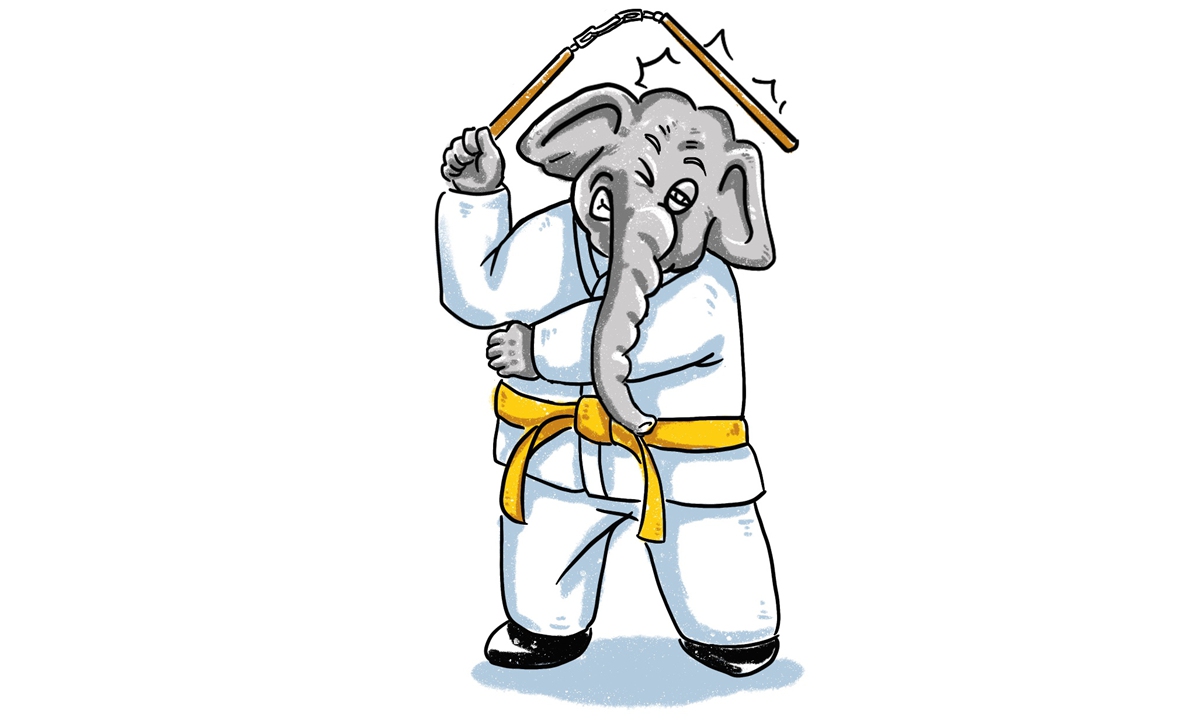Economic decoupling possible if India doesn’t calm down
Source:Global Times Published: 2020/7/1 16:57:37

Illustration: Tang Tengfei/GT
Following the recent deadly border clash, India's overheating nationalism against China has spilled over into economic fields. There is a rising risk of a significant economic decoupling between the two nations if India continues to damage bilateral relations or intentionally causes more border conflicts.After announcing a ban on 59 Chinese mobile apps, Indian authorities are considering similar measures in other sectors including chemicals, electronics, heavy machinery and pharmaceuticals, according to a report from Forbes.
Concerns of a full-fledged trade war between China and India have been raised. But with a relatively small-scale trade volume between the two, any conflict may not expand to the point of an economic war.
China retains a trade surplus with India, meaning China would bear trade losses in the short term if economic strife intensifies. In the long run, that would drastically hit India's investment environment.
Take the IT industry as an example. Chinese IT companies have launched massive investments in India and have most likely encountered huge losses following the app ban by the Indian government. Their willingness to invest further in the country has greatly diminished, and India does not possess sufficient momentum to develop its IT industry independently at the current stage.
India is trying to gather more bargaining chips by adopting a seemingly tough attitude, which will in reality bring it even more economic pains. As the country has shown little willingness to rectify its strategy, it is clear that India is preparing for a long-term conflict scenario.
Though China is always willing to resolve disputes through faithful negotiations based on the principles of equality and peace, more economic provocations from the Indian government are almost certain to meet strong countermeasures from Beijing.
And if New Delhi chooses to go further off track and provoke a military war with China, a complete economic decoupling between the two countries is highly likely.
From the Indian perspective, a full economic decoupling from China may draw its economy back to its predicament two decades ago. And the country has already been hit hard by the coronavirus pandemic, with over 566,000 confirmed COVID-19 cases by Wednesday. According to a recent forecast by S&P Global Ratings, the Indian economy may contract by 5 percent this year.
With so many challenges lurking, it is suggested that New Delhi should not seek a military conflict with China.
China has always adhered to the path of peaceful development, and does not wish to enter any form of war with other countries. As the world's second-largest economy, China has been ramping up efforts to shore up economic development and regain growth momentum, such as promoting industrial upgrades and launching comprehensive poverty alleviation work. Fierce conflicts or a hot war with India are not what China needs.
In addition to China and India - the two giant emerging economies in Asia - many Asian countries and regions would be impacted by an intensified dispute between the two, and may even need to pick a side, which they would see as an undesirable scenario. Asia will be the world's next economic center if it can continue its 30 years of peaceful development. The region cannot afford a large-scale military confrontation between China and India.
The two countries had in previous years accumulated a favorable understanding. India is expected to resume rational foreign policy, and the two sides could resolve their disputes through talks. Though it is undoubtedly a difficult task, a peaceful environment will always benefit both peoples, as well as the whole Asian region.
The article was compiled based on a Global Times interview with Zhao Gancheng, a research fellow at the Shanghai Institute for International Studies. bizopinion@globaltimes.com.cn
Posted in: EXPERT ASSESSMENT